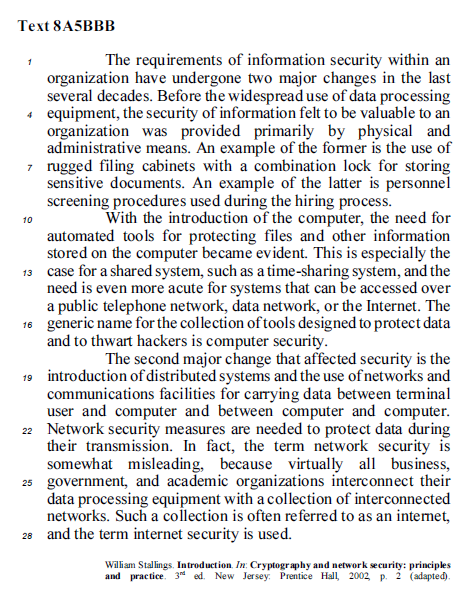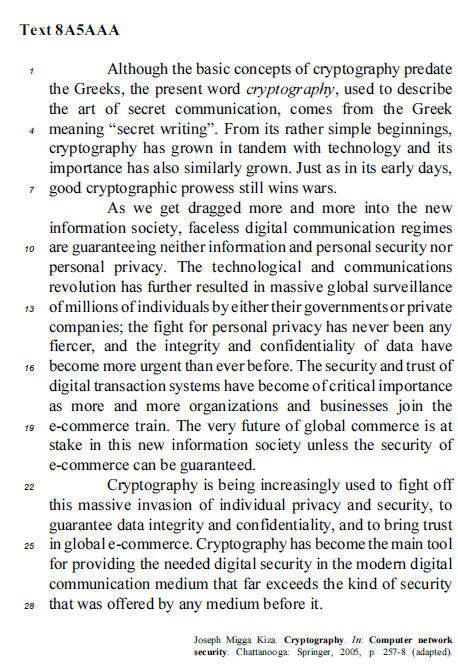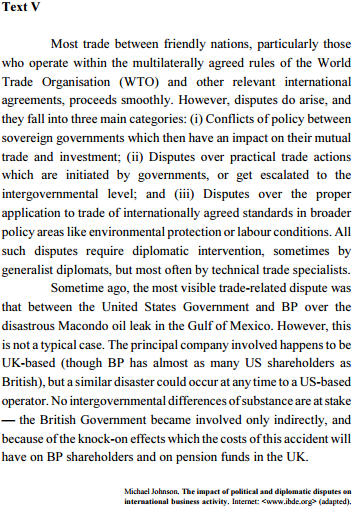Questões de Concurso Sobre inglês
Foram encontradas 17.635 questões
Reality Television
Reality television is a genre of television programming which, it is claimed, presents unscripted dramatic or humorous situations, documents actual events, and features ordinary people rather than professional actors. It could be described as a form of artificial or "heightened" documentary. Although the genre has existed in some form or another since the early years of television, the current explosion of popularity dates from around 2000.
Reality television covers a wide range of television programming formats, from game or quiz shows which resemble the frantic, often demeaning programmes produced in Japan in the 1980s and 1990s (a modern example is Gaki no tsukai), to surveillance- or voyeurism- focused productions such as Big Brother.
Critics say that the term "reality television" is somewhat of a misnomer and that such shows frequently portray a modified and highly influenced form of reality, with participants put in exotic locations or abnormal situations, sometimes coached to act in certain ways by off-screen handlers, and with events on screen manipulated through editing and other post-production techniques.
Part of reality television's appeal is due to its ability to place ordinary people in extraordinary situations. For example, on the ABC show, The Bachelor, an eligible male dates a dozen women simultaneously, travelling on extraordinary dates to scenic locales. Reality television also has the potential to turn its participants into national celebrities, outwardly in talent and performance programs such as Pop Idol, though frequently Survivor and Big Brother participants also reach some degree of celebrity.
Some commentators have said that the name "reality television" is an
inaccurate description for several styles of program included in the genre.
In competition-based programs such as Big Brother and Survivor, and
other special-living-environment shows like The Real World, the producers
design the format of the show and control the day-to-day activities and the
environment, creating a completely fabricated world in which the
competition plays out. Producers specifically select the participants, and
use carefully designed scenarios, challenges, events, and settings to
encourage particular behaviours and conflicts. Mark Burnett, creator of
Survivor and other reality shows, has agreed with this assessment, and
avoids the word "reality" to describe his shows; he has said, "I tell good
stories. It really is not reality TV. It really is unscripted drama."
Reality Television
Reality television is a genre of television programming which, it is claimed, presents unscripted dramatic or humorous situations, documents actual events, and features ordinary people rather than professional actors. It could be described as a form of artificial or "heightened" documentary. Although the genre has existed in some form or another since the early years of television, the current explosion of popularity dates from around 2000.
Reality television covers a wide range of television programming formats, from game or quiz shows which resemble the frantic, often demeaning programmes produced in Japan in the 1980s and 1990s (a modern example is Gaki no tsukai), to surveillance- or voyeurism- focused productions such as Big Brother.
Critics say that the term "reality television" is somewhat of a misnomer and that such shows frequently portray a modified and highly influenced form of reality, with participants put in exotic locations or abnormal situations, sometimes coached to act in certain ways by off-screen handlers, and with events on screen manipulated through editing and other post-production techniques.
Part of reality television's appeal is due to its ability to place ordinary people in extraordinary situations. For example, on the ABC show, The Bachelor, an eligible male dates a dozen women simultaneously, travelling on extraordinary dates to scenic locales. Reality television also has the potential to turn its participants into national celebrities, outwardly in talent and performance programs such as Pop Idol, though frequently Survivor and Big Brother participants also reach some degree of celebrity.
Some commentators have said that the name "reality television" is an
inaccurate description for several styles of program included in the genre.
In competition-based programs such as Big Brother and Survivor, and
other special-living-environment shows like The Real World, the producers
design the format of the show and control the day-to-day activities and the
environment, creating a completely fabricated world in which the
competition plays out. Producers specifically select the participants, and
use carefully designed scenarios, challenges, events, and settings to
encourage particular behaviours and conflicts. Mark Burnett, creator of
Survivor and other reality shows, has agreed with this assessment, and
avoids the word "reality" to describe his shows; he has said, "I tell good
stories. It really is not reality TV. It really is unscripted drama."
Reality Television
Reality television is a genre of television programming which, it is claimed, presents unscripted dramatic or humorous situations, documents actual events, and features ordinary people rather than professional actors. It could be described as a form of artificial or "heightened" documentary. Although the genre has existed in some form or another since the early years of television, the current explosion of popularity dates from around 2000.
Reality television covers a wide range of television programming formats, from game or quiz shows which resemble the frantic, often demeaning programmes produced in Japan in the 1980s and 1990s (a modern example is Gaki no tsukai), to surveillance- or voyeurism- focused productions such as Big Brother.
Critics say that the term "reality television" is somewhat of a misnomer and that such shows frequently portray a modified and highly influenced form of reality, with participants put in exotic locations or abnormal situations, sometimes coached to act in certain ways by off-screen handlers, and with events on screen manipulated through editing and other post-production techniques.
Part of reality television's appeal is due to its ability to place ordinary people in extraordinary situations. For example, on the ABC show, The Bachelor, an eligible male dates a dozen women simultaneously, travelling on extraordinary dates to scenic locales. Reality television also has the potential to turn its participants into national celebrities, outwardly in talent and performance programs such as Pop Idol, though frequently Survivor and Big Brother participants also reach some degree of celebrity.
Some commentators have said that the name "reality television" is an
inaccurate description for several styles of program included in the genre.
In competition-based programs such as Big Brother and Survivor, and
other special-living-environment shows like The Real World, the producers
design the format of the show and control the day-to-day activities and the
environment, creating a completely fabricated world in which the
competition plays out. Producers specifically select the participants, and
use carefully designed scenarios, challenges, events, and settings to
encourage particular behaviours and conflicts. Mark Burnett, creator of
Survivor and other reality shows, has agreed with this assessment, and
avoids the word "reality" to describe his shows; he has said, "I tell good
stories. It really is not reality TV. It really is unscripted drama."
In text 8A5BBB, the word “often” ( .27) can be correctly replaced
by
.27) can be correctly replaced
by
In text 8A5BBB, the word “former” ( .6) refers to
.6) refers to
In text 8A5AAA, the word “unless” ( .20) conveys the idea of
.20) conveys the idea of
Decide whether the following statements are right (C) or wrong (E) according to text V.
Intergovernmental differences of substance are not involved in
the case.
Decide whether the following statements are right (C) or wrong (E) according to text V.
The main company involved in the Macondo accident is, just
by chance, based in UK.
Decide whether the following statements are right (C) or wrong (E) according to text V.
Never before has there been a dispute between the US
Government and BP.
Decide whether the following statements are right (C) or wrong (E) according to text V.
Disputes on international issues neither demand the
intervention of diplomats nor of technical trade experts.
Based on text V, decide whether the statements below are right (C) or wrong (E).
The majority of international trade is carried out free of
difficulties.
Based on text V, decide whether the statements below are right (C) or wrong (E).
Friendly nations are those ones which belong to WTO.
Based on text V, decide whether the statements below are right (C) or wrong (E).
Trade disputes can be categorized into at least three facets.
Based on text V, decide whether the statements below are right (C) or wrong (E).
There has never been any conflict between members of WTO.


